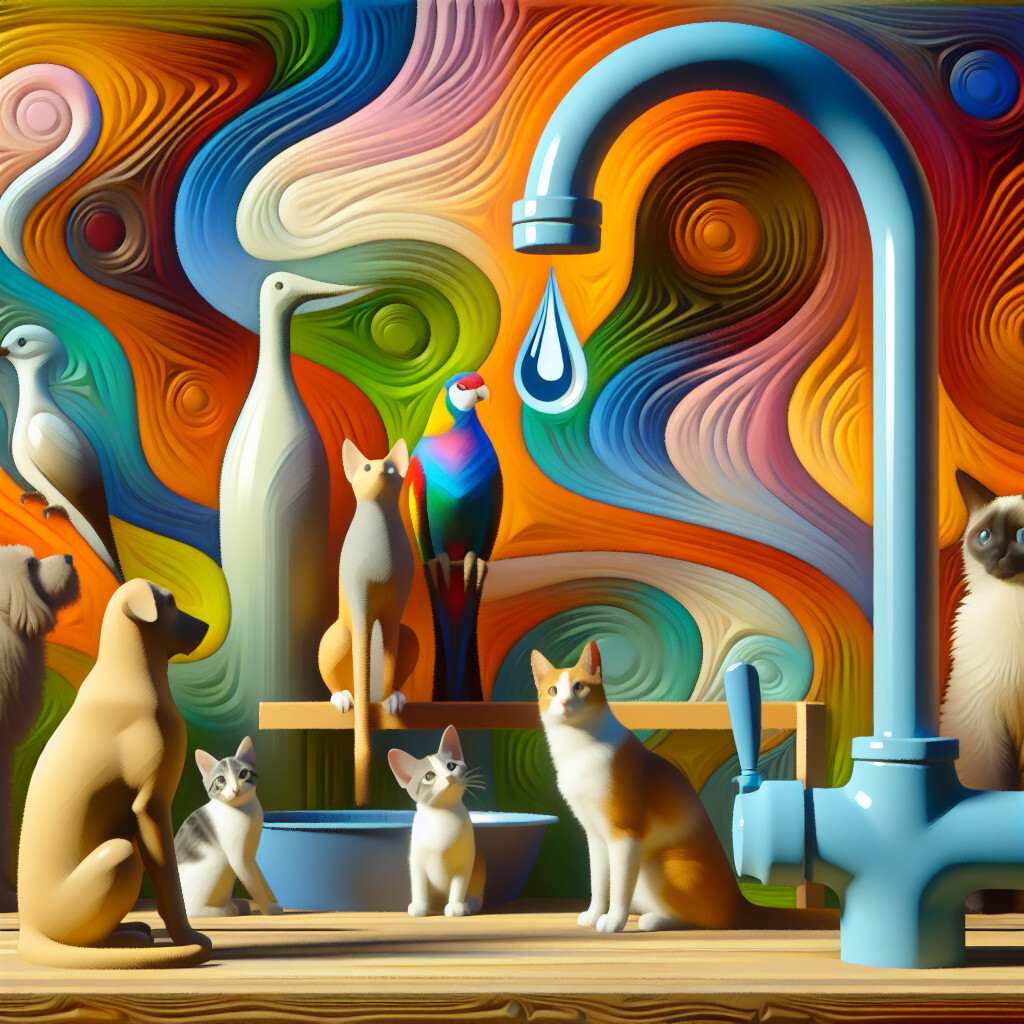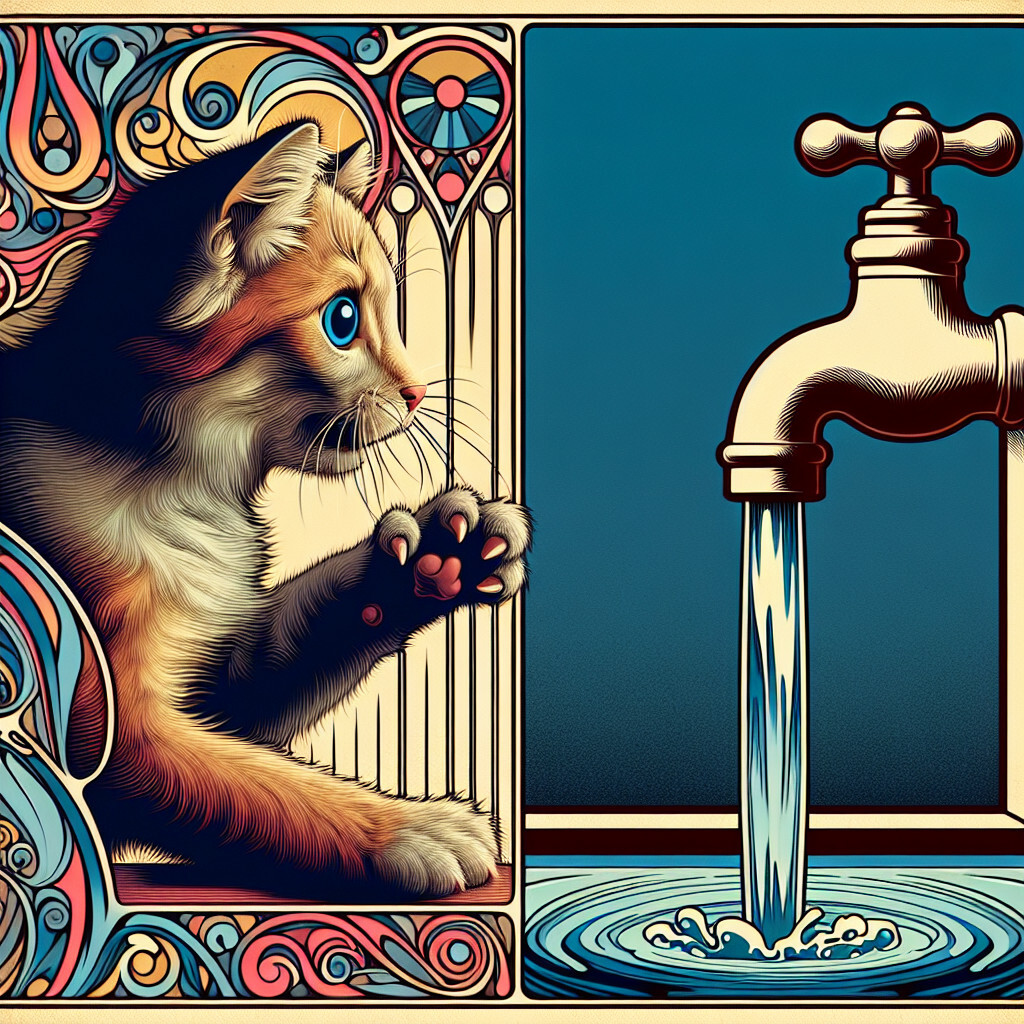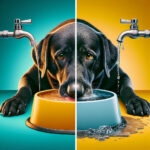-
Table of Contents
“Tap Water for Pets: A Question of Quality, Not Quantity.”
Introduction

Tap water can potentially be harmful to pets due to the various chemicals and contaminants it may contain. While most tap water is treated and deemed safe for human consumption, the presence of substances like chlorine, fluoride, and lead, which are often found in tap water, can pose health risks to pets over time. The effects of these contaminants on pets can vary, ranging from minor gastrointestinal issues to more serious conditions like kidney damage. Therefore, it’s important to understand the potential risks and consider safer alternatives for providing hydration to pets.
Understanding the Effects of Tap Water on Your Pets
Understanding the effects of tap water on your pets is a crucial aspect of responsible pet ownership. Many pet owners often wonder if tap water is bad for their pets. The answer to this question is not as straightforward as it may seem, as it largely depends on the quality of the tap water in your area and the specific needs of your pet.
Tap water, in many parts of the world, is treated and regulated to ensure it is safe for human consumption. This process typically involves the addition of chemicals such as chlorine and fluoride, which are used to kill bacteria and other harmful microorganisms. While these chemicals are generally safe for humans, they can potentially have adverse effects on pets, particularly those with sensitive digestive systems.
Chlorine, for instance, can cause mild to moderate gastrointestinal upset in pets, leading to symptoms such as vomiting and diarrhea. Fluoride, on the other hand, can lead to more serious health issues if consumed in large amounts over a long period. These can include dental fluorosis, a condition characterized by discoloration and pitting of the teeth, and skeletal fluorosis, which can cause pain and damage to bones and joints.
In addition to these chemicals, tap water can also contain heavy metals such as lead and copper. These metals can accumulate in a pet’s body over time, leading to a range of health problems including kidney disease, liver damage, and neurological disorders. Pets that are particularly susceptible to these effects include those that are young, old, or have pre-existing health conditions.
Furthermore, tap water can sometimes be contaminated with harmful bacteria and parasites. While this is relatively rare in developed countries with robust water treatment systems, it can still occur in certain circumstances, such as following a natural disaster or in areas with poor infrastructure. Pets that consume contaminated water can develop a range of illnesses, from mild gastrointestinal upset to serious, life-threatening infections.
Despite these potential risks, it’s important to note that not all tap water is bad for pets. Many pets drink tap water their entire lives without experiencing any adverse effects. The key is to be aware of the quality of your tap water and to take steps to mitigate any potential risks.
If you’re concerned about the quality of your tap water, there are several steps you can take. Firstly, you can have your tap water tested by a professional to determine what contaminants it may contain. Secondly, you can use a water filter to remove potentially harmful chemicals and heavy metals. Finally, you can consider providing your pet with bottled or distilled water, although this can be more expensive and less environmentally friendly than using tap water.
In conclusion, while tap water can potentially have adverse effects on pets, these risks can be managed with the right precautions. By understanding the quality of your tap water and taking steps to ensure it is safe for your pet, you can help to protect their health and wellbeing. As always, if you have any concerns about your pet’s health, it’s best to consult with a veterinarian.
Is Tap Water Harmful to Your Pets? Unveiling the Truth
Is tap water harmful to your pets? This is a question that has been asked by many pet owners, and the answer is not as straightforward as one might think. The quality of tap water can vary greatly from one location to another, and what may be safe for humans to drink may not necessarily be safe for our furry friends.
The primary concern with tap water is the presence of certain contaminants that can be harmful to pets. These can include heavy metals such as lead and copper, bacteria, viruses, and parasites. While these contaminants are typically present in very low levels, they can still pose a risk to pets, particularly those with weakened immune systems.
Another concern is the presence of chlorine, which is commonly used to disinfect tap water. While chlorine is generally safe for humans to consume in the amounts found in tap water, it can be harmful to pets, particularly fish and amphibians. For these pets, it is recommended to use dechlorinated water or to let the tap water sit out for 24 hours before use to allow the chlorine to dissipate.
Fluoride, another common additive in tap water, can also be a concern for pets. While fluoride is beneficial for human dental health, it can be harmful to pets in large amounts. Some studies have suggested that long-term consumption of fluoridated water can lead to health problems in pets, including dental fluorosis and kidney damage.
However, it’s important to note that the risk of these contaminants causing harm to your pet is generally quite low. Most tap water in developed countries is closely regulated and tested regularly to ensure it meets safety standards. Furthermore, many pets have been drinking tap water for years without any apparent ill effects.
That being said, if you’re concerned about the quality of your tap water, there are steps you can take to ensure it’s safe for your pets. One option is to use a water filter, which can remove many of the potentially harmful contaminants found in tap water. Another option is to provide your pets with bottled water, although this can be more expensive and less environmentally friendly.
In conclusion, while tap water can contain certain contaminants that may be harmful to pets, the risk is generally quite low. However, if you’re concerned about the quality of your tap water, there are steps you can take to ensure it’s safe for your pets. As always, if you notice any changes in your pet’s health or behavior after drinking tap water, it’s best to consult with a veterinarian.
In the end, the health and well-being of our pets is of utmost importance. By being aware of the potential risks associated with tap water and taking steps to mitigate these risks, we can help ensure our pets live long, healthy lives. After all, they are not just pets, but cherished members of our families.
The Impact of Tap Water on Pet Health: A Comprehensive Study
The health and well-being of our pets is a matter of paramount importance to all pet owners. One aspect of pet care that often goes overlooked, however, is the type of water we provide for our pets. Many pet owners simply fill their pet’s water bowl straight from the tap, without considering the potential impact this could have on their pet’s health. This article aims to provide a comprehensive study on the impact of tap water on pet health.
Tap water, while generally safe for human consumption, can sometimes contain substances that may not be suitable for pets. These substances can range from minerals and heavy metals to chemicals and bacteria. The presence of these substances in tap water can vary greatly depending on the geographical location and the quality of the local water supply.
One of the most common substances found in tap water is chlorine. While chlorine is used to kill harmful bacteria and make the water safe for human consumption, it can be harmful to pets, particularly fish and amphibians, who are sensitive to changes in their water environment. Ingesting high levels of chlorine can lead to health issues such as skin irritation, eye problems, and in severe cases, damage to the respiratory system.
Another substance often found in tap water is fluoride. While fluoride is beneficial for human dental health, it can be harmful to pets, particularly dogs and cats. High levels of fluoride can lead to a condition known as fluorosis, which can cause discolouration and damage to the teeth. In severe cases, it can also lead to skeletal problems.
Heavy metals such as lead and copper are also often present in tap water. These metals can accumulate in the body over time, leading to a range of health issues. For example, lead can affect the nervous system, leading to behavioural changes, seizures, and in severe cases, death. Copper, on the other hand, can lead to gastrointestinal issues and damage to the liver and kidneys.
In addition to these substances, tap water can also contain bacteria and parasites that can cause illness in pets. While most of these organisms are killed by the chlorine in the water, some can survive and cause diseases such as giardiasis and cryptosporidiosis.
Despite these potential risks, it’s important to note that not all tap water is bad for pets. Many pets drink tap water their entire lives without experiencing any health issues. The quality of tap water can vary greatly from one location to another, and in many cases, it is perfectly safe for pets to drink.
However, if you’re concerned about the quality of your tap water, there are steps you can take to ensure it’s safe for your pets. You can have your water tested for contaminants, or you can use a water filter to remove potentially harmful substances. Alternatively, you can provide your pets with bottled water, although this can be a more expensive option.
In conclusion, while tap water can contain substances that may be harmful to pets, the risk is generally low and there are steps you can take to ensure your pet’s water is safe. As always, if you have any concerns about your pet’s health, it’s best to consult with a veterinarian.
Debunking Myths: The Safety of Tap Water for Pets
There is a common misconception that tap water is harmful to pets, a belief that has led many pet owners to opt for bottled or filtered water for their furry friends. However, this notion is largely based on myths and misconceptions, and it is essential to debunk these myths to ensure that pet owners are well-informed about the safety of tap water for their pets.
Firstly, it is important to understand that the quality of tap water can vary greatly depending on the geographical location. In many developed countries, tap water is subject to stringent regulations and regular testing to ensure it is safe for human consumption. If the tap water in your area is deemed safe for you, it is generally safe for your pets as well.
However, it is also crucial to note that while tap water is typically safe for pets, it may contain certain minerals or chemicals that, although harmless to humans, could potentially be harmful to pets in large quantities. For instance, tap water often contains chlorine, which is used to kill bacteria and other microorganisms. While small amounts of chlorine are generally safe for pets, larger quantities can cause gastrointestinal upset.
Another common concern is the presence of fluoride in tap water. Fluoride is added to tap water in many areas to promote dental health in humans. While it is generally safe for pets, excessive consumption can lead to health issues such as dental fluorosis, a condition that causes discoloration and pitting of the teeth.
Despite these potential concerns, it is important to remember that the levels of these substances in tap water are typically well within safe limits. Moreover, many pet food brands incorporate balanced levels of minerals and other nutrients in their products, which can help to offset any potential deficiencies or excesses caused by drinking tap water.
In addition, it is worth noting that bottled water is not necessarily a safer option for pets. Bottled water is not subject to the same rigorous testing and regulations as tap water, and it can also contain minerals and other substances that could be harmful to pets in large quantities. Furthermore, the environmental impact of bottled water, including the production of plastic waste, is a significant concern.
If you are still concerned about the safety of tap water for your pets, there are several steps you can take. You can request a water quality report from your local water provider, which will provide detailed information about the water in your area. Alternatively, you can consider using a water filter, which can remove many of the potentially harmful substances found in tap water.
In conclusion, while there are some potential concerns associated with tap water, it is generally safe for pets to drink. The key is to be informed about the quality of your local tap water and to take appropriate steps if necessary. By debunking the myths surrounding tap water and pets, we can ensure that our furry friends stay hydrated and healthy.
Q&A
1. Question: Can tap water harm my pet?
Answer: Generally, tap water is considered safe for pets. However, it can sometimes contain harmful substances like lead, chlorine, and other chemicals, depending on your local water supply.
2. Question: Is it better to give pets filtered water?
Answer: Yes, giving pets filtered water can be a safer option as it removes many potential contaminants, providing cleaner and healthier water for your pets.
3. Question: Can the chlorine in tap water affect my pet’s health?
Answer: Yes, chlorine in tap water can potentially cause minor gastrointestinal discomfort in pets. Some pets may also be sensitive or allergic to chlorine, causing skin irritations.
4. Question: What are the signs that tap water is affecting my pet’s health?
Answer: Signs could include vomiting, diarrhea, skin irritations, changes in behavior, or loss of appetite. If you notice any of these symptoms, it’s best to consult with a veterinarian.
Conclusion
Based on various research and expert opinions, tap water is generally not bad for pets. However, the quality of tap water can vary greatly depending on the location and local water treatment practices. If the tap water is safe for human consumption, it is typically safe for pets as well. But if there are concerns about potential contaminants, using filtered or bottled water can be a safer option for pets.






